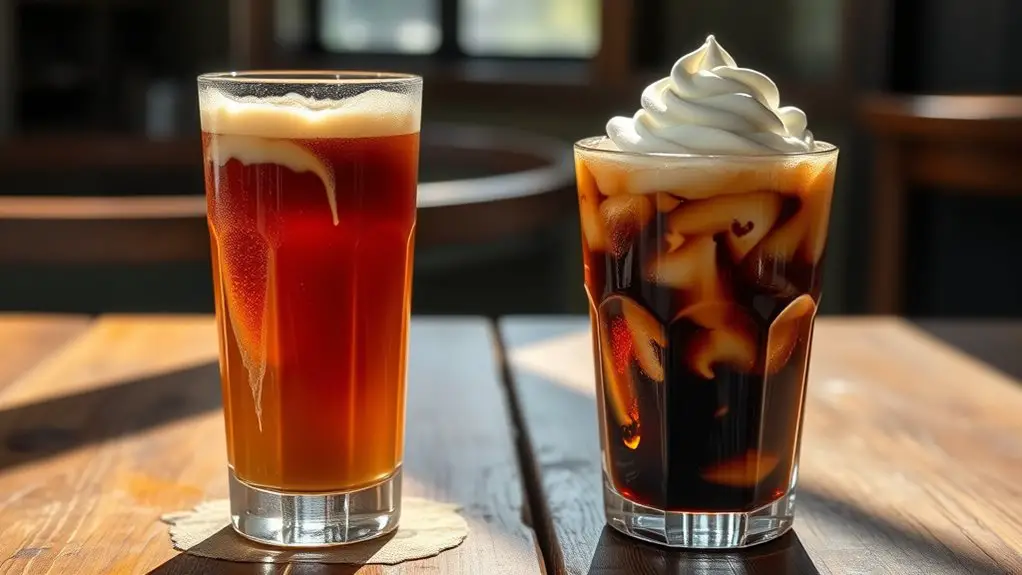Cold brew and iced coffee differ mainly in brewing methods. Cold brew uses coarsely ground coffee steeped in cold water for 12 to 24 hours, resulting in a smooth, less acidic drink. Iced coffee, brewed hot, boasts a bolder flavor and pronounced acidity. Cold brew often has higher caffeine content and antioxidant levels, while iced coffee is more invigorating. Both have unique health benefits and serving styles. Curious about their flavor profiles and more nuances? There's plenty to explore!
Brewing Methods: Cold Brew vs. Iced Coffee
When you're deciding between cold brew and iced coffee, understanding their brewing methods can greatly influence your choice. Cold brew relies on a slow extraction technique, steeping coarsely ground coffee in cold water for 12 to 24 hours. This low water temperature results in a smoother, less acidic beverage, allowing you to savor its natural flavors. On the other hand, iced coffee is typically brewed hot, using boiling water to extract flavors rapidly, then cooled down with ice. The higher water temperature in this method extracts more oils and acids, leading to a bolder taste. Knowing these differences can empower you to choose the brew that aligns with your personal preferences and lifestyle, giving you the freedom to enjoy your coffee just the way you like it.
Flavor Profiles: What to Expect
While both cold brew and iced coffee offer unique taste experiences, their flavor profiles cater to different preferences. Understanding the taste nuances and aroma differences can enhance your appreciation for each.
- Cold Brew: Expect a smoother, less acidic profile with chocolatey, caramel notes.
- Iced Coffee: You'll find a brighter, more pronounced acidity, often bringing out fruity or floral undertones.
- Sweetness: Cold brew tends to taste naturally sweeter due to its brewing method, while iced coffee may require added sugar or cream.
- Aroma: Cold brew has a rich, mellow aroma, while iced coffee offers a fresher scent that can be invigorating.
Choosing between them ultimately comes down to your flavor preferences and mood, allowing you to embrace your coffee journey freely.
Caffeine Content: Which Packs a Punch?
How does the caffeine content in cold brew compare to iced coffee? If you're looking for a caffeine boost, cold brew often packs a stronger punch. Typically, cold brew is made with a higher coffee-to-water ratio and steeped for an extended period, resulting in a more concentrated caffeine source. While a standard 8-ounce serving of iced coffee generally contains about 80-100 mg of caffeine, cold brew can range from 150-200 mg in the same serving size. If energy levels are your priority, cold brew might be your go-to choice. However, keep in mind that individual coffee brands and brewing methods can vary, so it's always good to check the specifics if you're seeking that perfect jolt.
Serving Styles and Presentation
Although both cold brew and iced coffee share a chilled aesthetic, their serving styles and presentation can greatly differ, impacting your overall experience. When you choose between them, consider these aspects:
- Glassware Choices: Cold brew often shines in sleek, modern carafes, while iced coffee usually finds its home in classic tall glasses.
- Garnish Options: Cold brew is frequently adorned with a hint of orange zest or a sprig of mint, whereas iced coffee might sport whipped cream or a drizzle of caramel.
- Ice Presentation: Cold brew uses larger ice cubes to prevent dilution, while iced coffee often has standard-sized ice.
- Layering: Iced coffee can showcase layers of cream, offering a visual treat, unlike the uniform color of cold brew.
These details can elevate your sipping experience!
Health Benefits: Cold Brew vs. Iced Coffee
When considering your caffeine choices, which offers more health benefits: cold brew or iced coffee? Cold brew typically has higher antioxidant levels, thanks to its longer steeping process. This means you might get more health-boosting compounds that help combat oxidative stress.
On the flip side, iced coffee, brewed hot and then cooled, often has a higher acidity. If you're sensitive to acidity, you might find cold brew easier on your stomach. This acidity comparison can also affect flavor profiles, which may impact your overall enjoyment and, subsequently, your caffeine choices. Ultimately, both drinks have their unique benefits, but if you're seeking a smoother, less acidic option with a potential antioxidant edge, cold brew could be your go-to.
Frequently Asked Questions
Can I Make Cold Brew With Any Coffee Beans?
When it comes to brewing cold brew, you can certainly mix things up. But keep in mind, bean selection plays a vital role in flavor, so choose wisely for the best brewing methods and taste.
How Long Does Cold Brew Last in the Fridge?
Cold brew typically lasts about 7 to 10 days in the fridge. For ideal shelf life, store it in an airtight container, and keep it away from light and heat to preserve flavor and freshness.
Is Iced Coffee Stronger Than Hot Brewed Coffee?
You might find iced coffee's brew strength varies depending on the coffee flavor and brewing method. Typically, it's not inherently stronger than hot brewed coffee, but personal preference plays a significant role in your experience.
Can I Add Milk to Cold Brew Coffee?
You can add milk or milk alternatives to cold brew coffee for a creamier texture and flavor enhancements. It balances the bitterness, giving you a revitalizing drink that suits your taste preferences perfectly. Enjoy experimenting!
What Equipment Do I Need for Making Cold Brew?
To make cold brew, you'll need coarsely ground coffee, a brewing container, and a filter. Experiment with different brewing methods, like using a French press or dedicated cold brew maker, for the perfect taste and experience.
